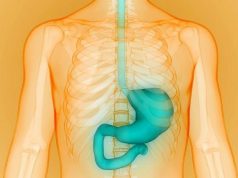Most common gastrointestinal issues seen are nausea/vomiting, abdominal pain, and diarrhea
By Elana Gotkine HealthDay Reporter
TUESDAY, April 15, 2025 (HealthDay News) — The rate of emergency department visits for adverse events among patients dispensed semaglutide is low, with most visits involving gastrointestinal effects, according to a research letter published online April 8 in the Annals of Internal Medicine.
Maribeth C. Lovegrove, M.P.H., from the U.S. Centers for Disease Control and Prevention in Atlanta, and colleagues characterized and quantified U.S. emergency department visits that clinicians attributed to semaglutide adverse events using data from the National Electronic Injury Surveillance System-Cooperative Adverse Drug Event Surveillance project.
The researchers found that based on 551 cases, there were an estimated 24,499 emergency department visits attributed to semaglutide adverse events in 2022 through 2023 (mean patient age, 50.9 years; 73.2 percent female); 82.6 percent were in 2023. In 81.7 percent of visits, semaglutide was the only medication implicated and was almost always in injectable form (94.0 percent); medication errors were involved in 9.0 percent of visits. Emergency department visits most often involved gastrointestinal effects, hypoglycemia, and allergic reactions (69.3, 16.5, and 5.5 percent, respectively); the gastrointestinal symptoms most commonly reported were nausea/vomiting, abdominal pain, and diarrhea (57.6, 25.1, and 12.2 percent, respectively). Hospitalization was required in 37.6 and 15.0 percent of emergency department visits for hypoglycemia and for gastrointestinal effects, respectively.
“Clinicians could counsel patients when initiating semaglutide about the potential for severe gastrointestinal adverse effects and adjust coprescribed antidiabetic medications to decrease hypoglycemia risk,” the authors write.
Copyright © 2025 HealthDay. All rights reserved.








